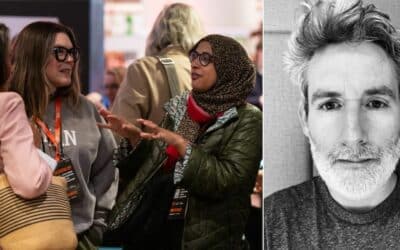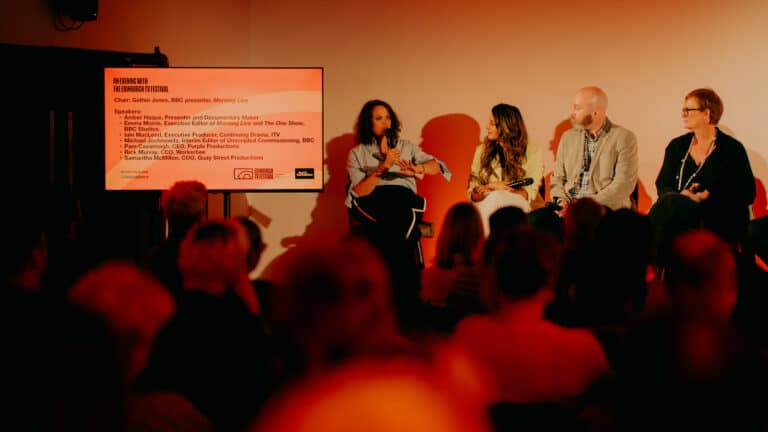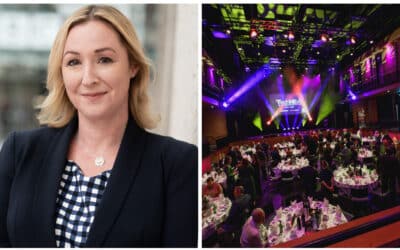The Edinburgh TV Festival landed in MediaCityUK last week for a debate to celebrate the event’s 50th anniversary, and it dived straight in with a damning report highlighting the prevalence of the old school tie network in the industry.
With almost 200 in attendance, the highly anticipated Edinburgh TV Festival evening debate did not disappoint, with a stellar line up of speakers addressing the recognised but rarely aired issue of class in TV.
The line-up included; Amber Haque, presenter and documentary maker; Emma Morris, executive editor of Morning Live and the One Show, BBC Studios; Iain Macleod, executive producer, continuing drama, ITV; Michael Jochnowitz, interim editor of unscripted commissioning BBC; Pam Cavannagh, CEO Purple Productions; Rick Murray, CEO, Workerbee, and Samantha McMillon, COO, Quay Street Productions.
Gethin Jones, BBC presenter Morning Live, navigated the night, kicking off with Amber Haque sharing damning topline findings from the Television Foundation’s Let’s Talk About Class: Appealing to the UK’s largest TV audience, report published this week.
The report revealed that nearly a quarter (22%) of people in leadership roles across the UK’s major broadcasters, streamers and large production companies, have the cultural and economic advantage of a private school education, compared to just 7.5% of the general population.
Haque urged the room: “Class is a taboo subject. We need to talk about class confidence.”
Emma Morris, Executive Editor of Morning Live and the One Show, BBC Studios, recognised the strength of being in a regional creative hub makes opportunities within the industry more accessible to young people from working class backgrounds – a sentiment echoed by Michael Jochnowitz, Interim Editor of Unscripted Commissioning BBC: “despite challenges in the industry the outlook is better than other regions – there’s more opportunity here.”
To help redress class bias, Pam Cavanagh, CEO, Purple Productions led the call for a shift to longer term contracts for entry level jobs: “It’s very important and an issue Purple Productions is putting into practice.”
Ian Macleod, executive producer, continuing drama, ITV, urged for a real commitment to fair financial renumeration for those breaking into the industry, also supported by Jochnowitz: “entry level pay needs to change.”
All commented on the startling drain of young talent due to the challenging climate and difficulty in sustaining a long term career within the industry. Samantha McMillon stressed the importance of mentorship, sharing candid anecdotes from her experience of mentoring early career starters and why they were leaving the industry.
The prevalence of short term contracts and irregular work supply are key contributing factors to why young talent are making the choice between “tesco or TV,” commented Morris.
Tackling the issue of short term sporadic contracts Jochnowitz suggested: “The approach on content should focus on long running series, this sustains contracts and the company. The focus should be on big returnable formats, year round productions.” On a positive note, he is seeing “NW based production companies working on these returning shows.”
A limited freelance pool and securing longevity of employment is a key issue that WorkerBee is addressing, Rick Murray, CEO Workerbee said: “Shifting from freelance to permanent contracts, becomes our biggest superpower and maintains the quality of delivery.”
Samantha echoed how Quay Productions is moving in the same trajectory, offering more long term contracts by moving script writers to development during the production cycle to hold talent.
On the issue of content, working class audiences want content they can connect to. Haque reflected how: “A tranche of commissioners and execs don’t understand being around working class people and that influences content. She urged for more NW based commissioners “people need to live and breathe it to understand it.”
Strongly supporting this sentiment ITV’s Macleod added: “60% of our audience is working class – lose sight of that at your peril – people want to see authenticity.”
Campbell Glennie, CEO The Edinburgh TV Festival said: “We’re delighted to have brought so many creative leaders together in MediaCity to have an inspiring conversation about class and the future of the region.”
Martin Chown, managing director, MediaCity added: “There are challenges ahead but also great opportunity. We’re committed to working with organisations such as the Salford Youth Zone, broadcasters, indies, academia and tech to help break down barriers and play our part in the success of the industry in the north of England and beyond.”












